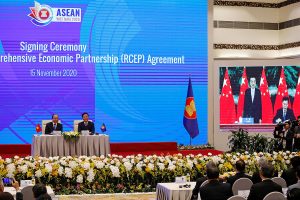TRADE Secretary Alfredo E. Pascual’s intention to join more free trade agreements received backing from major business chambers, who declared support for participating in the Regional Comprehensive Economic Partnership (RCEP).
Makati Business Club (MBC) Executive Director Francisco Alcuaz, Jr. said in a mobile phone message that the MBC supports Mr. Pascual’s plan to push for immediate RCEP ratification.
“We believe RCEP’s ratification is an important part of the open-for-business story we recently advanced with (the amended) Public Service Act (PSA), Retail Trade Liberalization Act, and Foreign Investments Act (FIA),” Mr. Alcuaz said.
British Chamber of Commerce Philippines Executive Director Chris Nelson said by mobile phone that while the priorities of the new Trade chief are generally on the right track, the Department of Trade and Industry (DTI) needs to push for further economic liberalization.
“We’ve seen (liberalization in) three key legislation that were passed, (amendments to the) Retail Trade Liberalization Act, the FIA, and PSA. We’d like to see that momentum continue,” Mr. Nelson said.
“I had a one-on-one discussion (with Mr. Pascual) and we agree on these priorities,” Philippine Chamber of Commerce and Industry President George T. Barcelon said.
Mr. Pascual announced his priorities during the DTI’s turnover ceremony on July 1.
“We will continue to push for the immediate ratification of the RCEP agreement and other trade agreements… These agreements will diversify the country’s exports… and enhance the country’s attractiveness to foreign investment,” Mr. Pascual said.
RCEP failed to obtain Senate approval in the 18th Congress after some senators objected to the lack of protections for parts of the farm industry. It is now up to the 19th Congress to decide on RCEP ratification. The session is set to open on July 25.
RCEP, which started taking effect on Jan. 1 in jurisdictions that approved it early, involves Australia, China, Japan, South Korea, New Zealand and the 10 members of the Association of Southeast Asian Nations.
Mr. Pascual also expressed his intent to sustain the development of micro, small, and medium enterprises (MSMEs) and improve the food value chain.
Calling MSMEs “the backbone of our economy,” he said he wants to “enable small businesses to grow and graduate from micro to small, from small to medium, and from medium to large.”
“To help address food security challenges, we will collaborate with the Department of Agriculture to improve the food value chains through upgraded transport and logistics facilities, including cold storage and cold chain facilities (and) increased community value adding,” he added.
“Increasing production and untangling bottlenecks are the effective way to fight inflation. Price controls and delayed suggested retail price adjustments will only squeeze production and result in actual, serious shortages,” the MBC’s Mr. Alcuaz said. — Revin Mikhael D. Ochave
